The first woman to own and operate a major league team, Marge Schott tarnished her legacy with her frequent use of racial slurs, her antisemitic views, and her apparent admiration of Adolf Hitler.
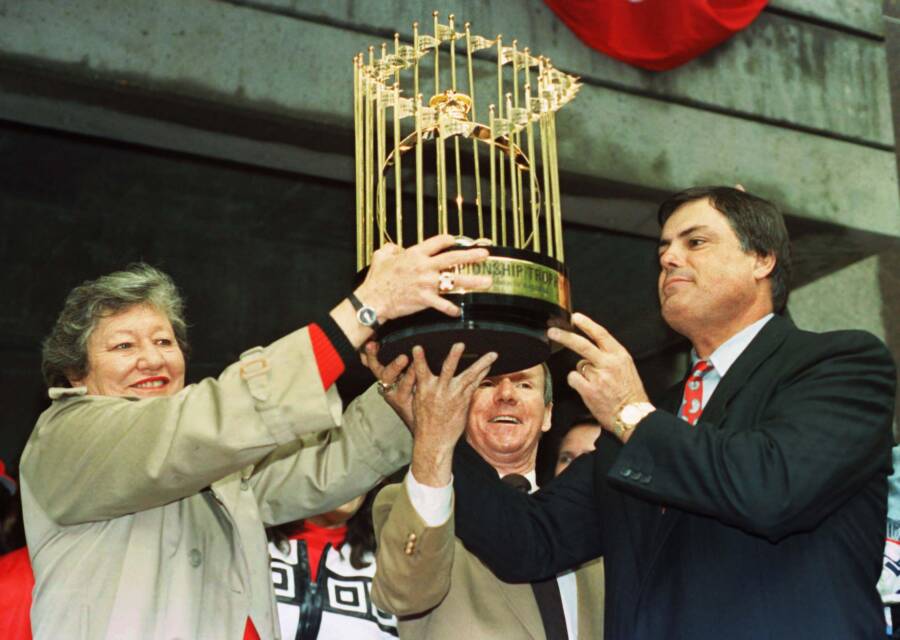
Michael Williams/ZUMAPRESS.com/ZUMA Press, Inc./AlamyMarge Schott (left) celebrating the Cincinnati Reds winning the 1990 World Series.
The Cincinnati Reds have had many different owners throughout the years. However, none are more infamous than Marge Schott, who owned and operated the baseball team from 1984 until 1999.
Her legacy is a controversial one. On the surface, she was the kind of owner you would want as a fan, because she came across as one. She was from Cincinnati, she bought the team for herself, and she kept ticket prices affordable for fans throughout her time as the owner.
But she was also notoriously stingy with her own team, sometimes even arranging for them to fly coach. She also allowed her dog to poop on the baseball field, forcing stadium workers to clean up the mess again and again. And most infamously, she made some incredibly racist comments against Black, Asian, and Jewish people — all while praising Adolf Hitler.
The Early Life Of Marge Schott And Her Long Connection To The Cincinnati Reds
Marge Schott was born Margaret Unnewehr on August 18, 1928, in Cincinnati, Ohio. Her father was known for making a fortune with his lumber business.
Marge came from a conservative family, and was raised in the Catholic Church. After graduating from Sacred Heart Academy, she married Charles Schott, who also came from a wealthy local family, in 1952.
The couple were together until 1968, when Charles suffered a heart attack and died. Marge Schott, now a widow, inherited her late husband’s auto dealerships, as well as his interests in other businesses.
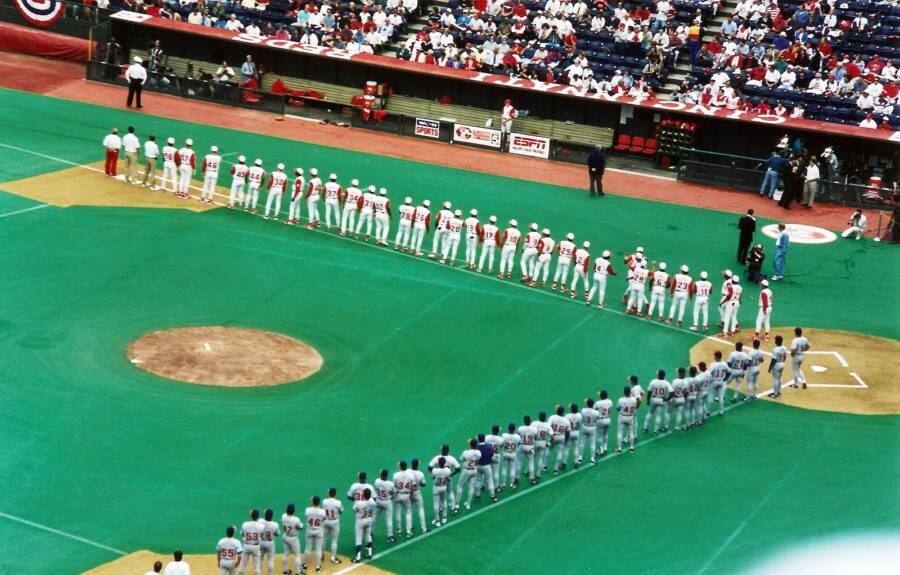
Doctorindy/Wikimedia CommonsGrowing up in Cincinnati, Marge Schott was long linked to the Reds, pictured here in 1995.
Meanwhile, the Cincinnati Reds were always part of Schott’s life. She was a longtime fan before she became professionally involved with the team.
In 1981, Schott purchased a minority stake in the team. But three short years later, in 1984, Schott purchased the Cincinnati Reds for a reported $11 million. She became the first woman to own and operate a major league team. The next year, Schott was made president and CEO of the Reds.
In 1990, the Reds won the World Series against the Oakland Athletics. It looked like good things were ahead for both the team and Schott.
Marge Schott Treated Fans Like Family — But Was Notoriously Stingy With Her Team
Unlike some other baseball executives, Marge Schott was willing to be a public-facing owner, a fact that would later prove to be her downfall. But many of her priorities kept her in the favor of fans of the Cincinnati Reds.
With Schott in charge, the most expensive seat in Cincinnati’s Riverfront Stadium was just $11.50, allowing more people to attend games. Concessions were similarly affordable, with Schott charging $1 for a hot dog.
Also, unlike some other owners, she was often present at games. She had a regular box seat, where she would sign autographs for fans and patiently speak with excited children. Schott also loved participating in the Wave.
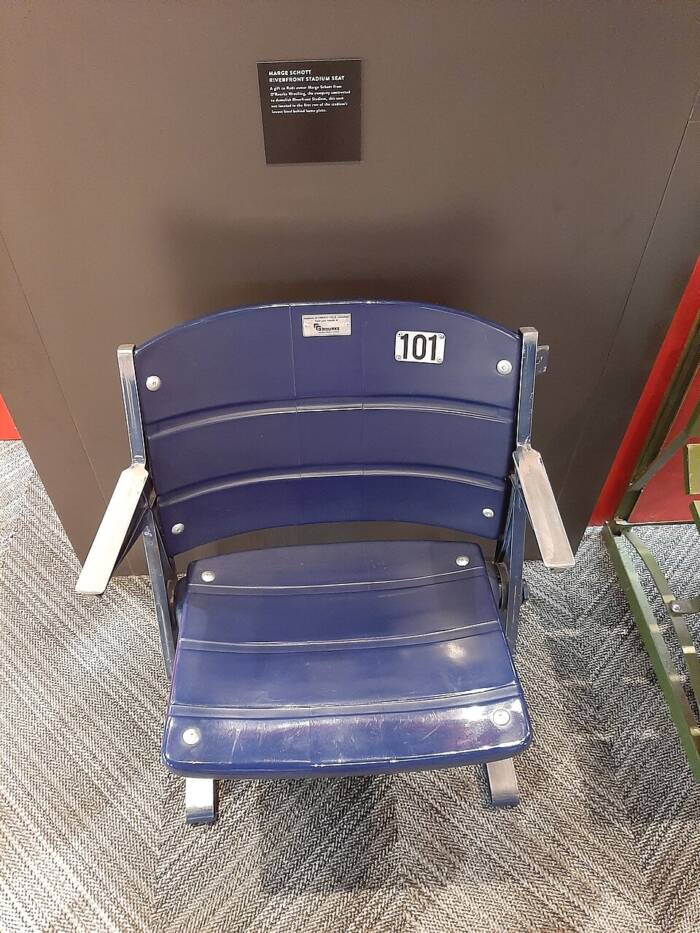
Wikimedia CommonsSchott always sat in the same seat at Cincinnati’s Riverfront Stadium.
Schott was also famous for her constant companion: her Saint Bernard named Schottzie. But as fun as it may sound to have a dog at the stadium, Schott reportedly did not keep a close eye on Schottzie, who would often poop on the field, leading to extra cleanup for stadium workers.
While many fans initially found Schott charming — and perhaps eccentric — some eventually began to criticize her for not spending enough money to put together a truly competitive team. Indeed, after their World Series win in 1990, the Reds struggled to replicate their success in later seasons.
Schott’s cheap attitude was reflected in her small front office, which was one of the lowest-paid in the league. She would also publicly complain about paying players who were recovering from painful injuries.
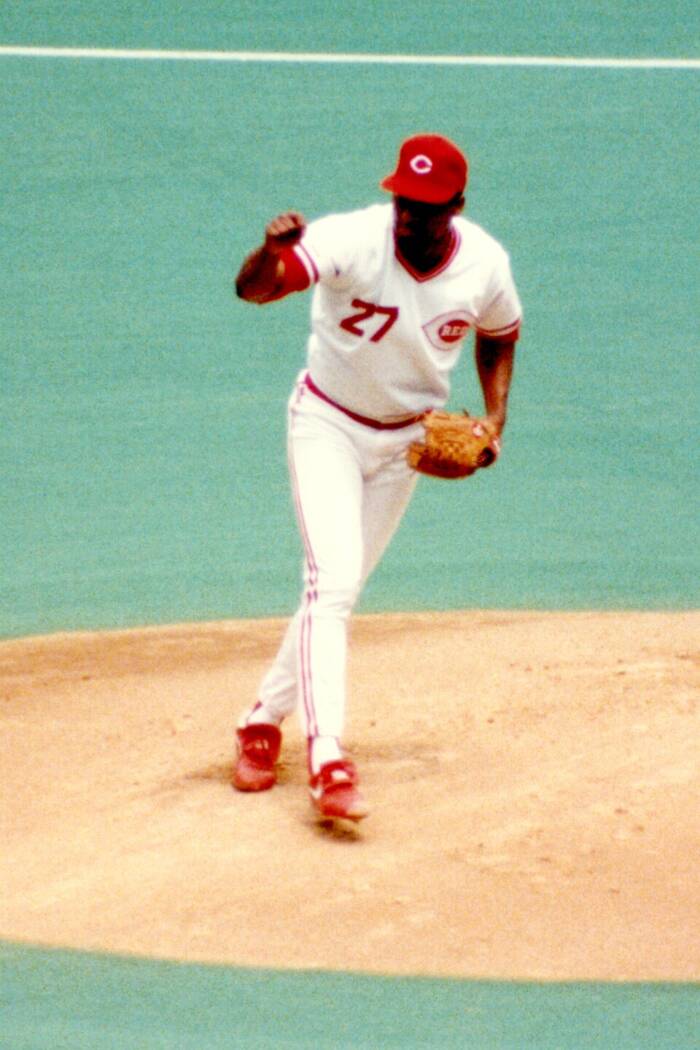
Wikimedia CommonsJosé Rijo led the Reds to victory in the 1990 World Series, but he also suffered a number of injuries as a player.
That included José Rijo, who famously played a key role in leading the Reds to their 1990 World Series win. Schott was quoted complaining about Rijo, “the guy I’m paying $3 million a year to sit on his butt.”
Former Reds player David Wells later described Schott as a “cheap psycho,” recalling flying in “the back section” of planes with his teammates: “And then we’d get our meal money, and we’d have pennies and nickels and dimes in it. I hated her! She was terrible. She was a bad person.”
It was also later revealed that Schott was not exactly overjoyed by the Reds’ victory against the Oakland Athletics at the 1990 World Series. Reportedly, she was upset that her team won in four games, as owners typically make a lot more money if the series goes into five games and beyond.
In fact, Schott was so frustrated that she refused to pay for the players’ celebration festivities that night. But all of these controversies pale in comparison to her racist behavior that would eventually be revealed.
Marge Schott Used Racial Slurs And Expressed Admiration For Adolf Hitler
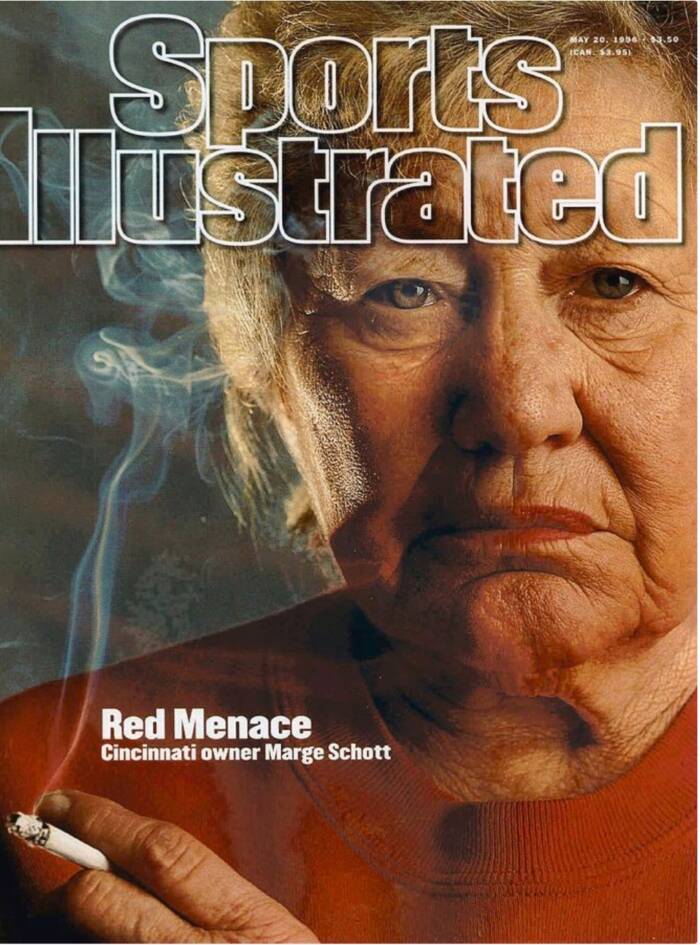
Sports IllustratedMarge Schott is most often remembered today for her racism and bigotry.
In 1992, former Reds marketing director Cal Levy made a number of shocking allegations against Marge Schott during a deposition for a lawsuit filed by Tim Sabo. Sabo was a former team controller who said he was wrongfully fired, in part because he opposed a policy of not hiring Black people.
According to Levy, Schott referred to Black baseball players as “million-dollar n***ers” and kept a Nazi swastika armband in her home. Roger Blaemire, the former vice president of business operations, backed up Levy’s claims, saying he also heard Schott saying racist remarks. Depositions showed that Schott allegedly declared that “sneaky goddamn Jews are all alike.”
Though Schott was cleared of wrongdoing in Sabo’s lawsuit, Schott continued to find herself in hot water, as more people came forward about her racist comments, including former Oakland Athletics executive assistant Sharon Jones, who quoted Schott as saying, “I would never hire another n***er. I’d rather have a trained monkey working for me than a n***er.”
Schott’s attempts to defend herself made the situation worse. She admitted to keeping a swastika armband in her home, but claimed it was a gift she received from an employee at one of her car agencies. She also said it was “no big deal” that she kept the armband with her Christmas decorations.
She didn’t deny using the term n***er, but claimed that “if and when” she had done so, “it was only kiddingly.” Schott also freely admitted to using the term “Jap” when speaking to Bill White, then the president of the National League. While laughing, she recalled, “Bill said to me, ‘Marge, will you quit that?’ I said, ‘Bill, I didn’t know it was so bad. But I’ll stop.'”
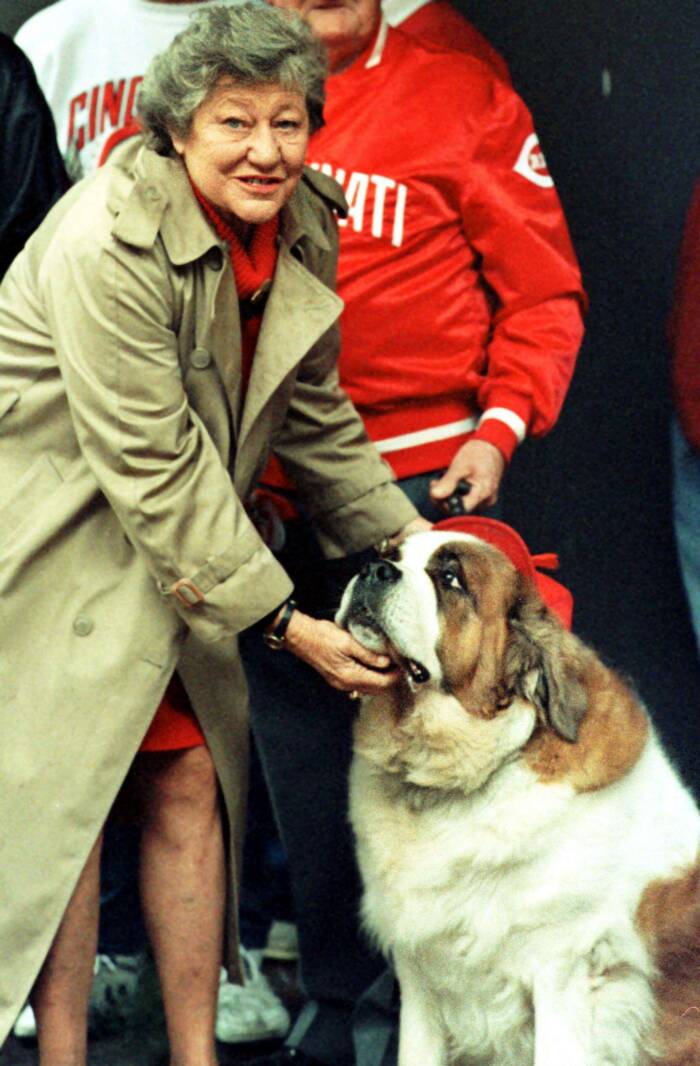
Michael Williams/ZUMAPRESS.com/ZUMA Press, Inc./AlamyMarge Schott’s bigotry eventually got her ousted from her job.
By 1993, Schott’s racism had gotten her into so much trouble that she was banned from day-to-day operation of the Reds for a year and fined $25,000. Major league baseball’s ruling executive council made the decision based on a 10-page report about Schott’s “racial and ethnic stereotyping.” The report not only included her use of slurs, but also claimed that she had said Adolf Hitler “had the right idea” for Jewish people, “but went too far.”
Despite her punishments, Schott complimented Hitler yet again in 1996, telling ESPN, “Everything you read, when he came in, he was good. They built tremendous highways and got all the factories going.”
Though Schott quickly issued an apology, she soon got herself in trouble again for speaking in a “cartoonish Japanese accent” while recalling her meeting with Japanese prime minister Kiichi Miyazawa in an interview with Sports Illustrated. In that same article, she responded to the sight of Asian American high school students by saying, “I don’t like it when they come here, honey, and stay so long and then outdo our kids. That’s not right.”
By June of 1996, baseball’s executive council had given Schott an ultimatum: Give up day-to-day operation of the Reds or face suspension. Schott soon agreed to give up the operation of the Reds through the 1998 season.
Surprisingly, it wasn’t until 1999 that Schott relinquished control of the Reds to a group that was led by Carl Lindner in a reported $67 million deal. Though Schott technically remained part of the Reds ownership as a limited partner, she had been effectively forced out of the organization.
People Still Remember Marge Schott’s Racism

Karin Johnson WLWT/X (Formerly Twitter)The University of Cincinnati’s Marge Schott Stadium was renamed to UC Baseball Stadium following protests in 2020.
Needless to say, Marge Schott was a polarizing and problematic team owner. But her influence went beyond the Cincinnati Reds’ baseball field.
In addition to owning the Reds, Schott was a major donor to the Cincinnati Zoo and the University of Cincinnati, which named its baseball stadium after her after her foundation gave $2 million to the university’s athletic programs.
Schott died at age 75 in Cincinnati on March 2, 2004, after suffering years of lung-related problems following a longtime cigarette-smoking habit.
Cincinnati Enquirer columnist Paul Daugherty memorialized her: “The true measure of a person is whether he or she leaves a place better than he or she found it. Is Cincinnati better for having raised and rooted Marge Schott? Yeah. Probably. Good Marge competed with Bad Marge, daily.”
Though some speculated that Schott’s legacy might later recover with the passage of time, it doesn’t seem like anyone has forgotten her controversies.
In 2020, student athletes at the University of Cincinnati began protesting the fact that the school’s baseball stadium was named after her.
Their efforts to change the name were successful, and by the end of June 2020, the university had agreed to rename the stadium (now UC Baseball Stadium) due to Schott’s “record of racism and bigotry.” Saint Ursula Academy in Cincinnati also removed Schott’s name from a science, language, and arts building that was built with the help of her donations.
Schott’s foundation responded amidst the conversations about renaming the buildings: “While we cannot make excuses for the rhetoric made by Mrs. Schott decades ago, we can ask you to learn from Mrs. Schott’s mistakes as well as her great love for Cincinnati. We appreciate what these great organizations bring to Cincinnati and we fully support the decisions made by the organizations who have received grants from the Foundation.”
Next, go inside the history of women’s baseball. Then, discover the sad story of Jackie Robinson Jr., the baseball great’s eldest son.





